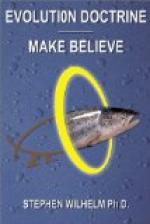In sharp contrast to Lamarckianism, so called,—although it did not originate in the mind of the noted man of science whose name it bears,—is the doctrine of natural selection, first proposed in its full form by Charles Darwin. This doctrine presents a wholly natural description of the method by which organisms evolve, putting all of the emphasis upon the congenital causes of variation, although the reality of other kinds of change is not questioned. But the contrast between Darwinism and the other descriptions of secondary factors can best be made after a somewhat detailed discussion of the former, which has gained the adherence of the majority of the naturalists of to-day. However, we must not pass on without pointing out that however much the explanations given by various men of science may differ, they all agree in expressly recognizing the complete naturalness of the secondary as well as of the primary factors of evolution.
* * * * *
The doctrine of natural selection forms the best basis for the detailed discussion of the way evolution has come about in the past and how it is going on to-day. This is true because it was the first description of nature’s program to carry conviction to the scientific world, and because its major elements have stood the test of time as no other doctrine has done. Much has been added to our knowledge of natural processes during post-Darwinian times, and new discoveries have supplemented and strengthened the original doctrine in numerous ways, although they have corrected certain of the minor details on the basis of fuller investigation.
At the outset it must be clearly understood that Darwin’s doctrine is concerned primarily with the method and not with the evidences as to the actual fact of evolution. Most of those who are not familiar with the principles of science believe that Darwin discovered this process; but their opinion is not correct. The reality of natural change as a universal attribute of living things had been clearly demonstrated long before Darwin wrote the remarkable series of books whose influence has been felt outside the domains of biology and to the very confines of organized knowledge everywhere. The “Origin of Species” was published in 1859, and only the last of its fourteen




